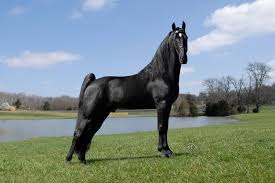
Tennessee Walking Horse
Conditions of detention
Tennessee Walking Horses adapt well to a variety of living conditions, though they thrive best with access to open spaces where they can move freely. They need a stable or shelter to protect them from extreme weather but benefit from regular turnout in a pasture.
Useful Fact: These horses are known for their calm nature, which makes them less prone to stress in different environments compared to more high-strung breeds.
Nutrition and diet
The diet of a Tennessee Walking Horse should consist of high-quality hay, fresh grass, and a balanced feed with the necessary vitamins and minerals. Their diet should be adjusted based on their level of activity and age.
Useful Fact: Due to their relatively calm temperament, Tennessee Walking Horses may require fewer calories than more active breeds, but their diet should still be nutrient-rich to maintain their health.
Health
Tennessee Walking Horses are generally healthy and hardy, but like all breeds, they are prone to certain issues such as laminitis, equine metabolic syndrome, and joint problems. Regular veterinary care is essential.
Useful Fact: The breed’s unique gait does not predispose it to the joint problems seen in some other gaited breeds, making them relatively low-maintenance in terms of orthopedic health.
Grooming and care
Regular grooming is necessary to keep the Tennessee Walking Horse’s coat healthy and to check for any signs of injury or illness. Hoof care is especially important, as with any horse, to prevent issues like thrush or hoof cracks.
Useful Fact: Their smooth and sleek coat is relatively easy to maintain, requiring standard grooming practices like brushing and regular bathing.
Education and training
Tennessee Walking Horses are known for their intelligence and willingness to learn. They respond well to positive reinforcement and gentle training methods. Early training is recommended, especially to refine their natural gaits.
Useful Fact: Their natural “running walk” gait can be enhanced through specific training techniques, making them stars in both trail riding and show arenas.
Toys and entertainment
These horses enjoy activities that engage their minds as well as their bodies. Puzzle feeders, balls, and other interactive toys can help keep them entertained when they are not being ridden.
Useful Fact: Mental stimulation through toys or varied activities can help prevent boredom and associated behavioral issues in Tennessee Walking Horses.
Safety
Tennessee Walking Horses are generally calm and easygoing, but they still require secure fencing to keep them safe. Fencing should be well-maintained to prevent escapes or injuries.
Useful Fact: Their calm demeanor makes them less likely to panic or bolt compared to more spirited breeds, but safety precautions should always be in place.
Accessories
Common accessories include well-fitted saddles designed for gaited horses, bridles, and protective leg gear, especially if they are used for trail riding or showing.
Useful Fact: Gaited saddles are often recommended to accommodate the unique movement of Tennessee Walking Horses, ensuring the rider’s comfort as well.
Socialization
Tennessee Walking Horses are social animals and enjoy the company of other horses. They also bond well with their human handlers and are often described as people-oriented.
Useful Fact: Their friendly nature makes them suitable for beginner riders and those looking for a gentle and cooperative equine companion.
Travel and Transportation
These horses generally travel well, but as with any horse, it’s important to make sure they are comfortable and secure during transport. Regular stops on long journeys for water and rest are advisable.
Useful Fact: Tennessee Walking Horses are often calm during transport, which makes them easier to handle compared to more nervous breeds.
Behavior and psychology
Tennessee Walking Horses are known for their gentle and docile temperament. They are generally easy to train and are well-suited to a variety of riders, including beginners.
Useful Fact: Their calm and patient nature makes them ideal for therapeutic riding programs and other activities that require a gentle and reliable horse.
Legal aspects
Ownership of Tennessee Walking Horses may involve specific legal considerations, especially if they are used in showing. The breed has a history of controversy related to the practice of “soring” (an illegal practice to exaggerate their gait), and it is important to ensure compliance with animal welfare laws.
Useful Fact: The Horse Protection Act in the United States specifically addresses the issue of soring, and owners should be familiar with these regulations to ensure humane treatment of their horses.


